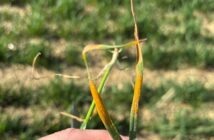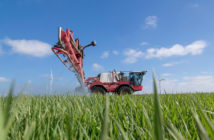Maintaining production of many UK crops is at risk if neonicotinoids, the pesticides linked with harming bees, are more widely restricted or banned completely, says Rothamsted Research in a position statement.
“Furthermore, if groups of chemistries are limited by legislation, the remaining groups will be more widely used, resulting in an increased risk of pests developing resistance to them,” continues the statement from Rothamsted, the longest-running agricultural research institute in the world.
The institute’s concern follows the release of draft proposals by the EU to replace its temporary restriction on the use of three neonicotinoids on crops that flower, introduced in 2013 in response to disputed claims about the impact of the pesticides on bees, with a widespread ban across Europe.
In the UK, the “restricted use” ban affected mainly oilseed rape crops. “It will be very difficult, if not impossible, to maintain production of many crops if neonicotinoids are more widely restricted or banned completely,” says the Rothamsted statement.
“For example, in sugar beet, the control of aphids and the virus diseases they spread, is totally reliant on neonicotinoid seed treatments because the aphids are resistant to other control chemistries,” it notes.
The statement also highlights how the neonicotinoid ban has cost the European oilseed rape farming industry €900million a year, according to the European Crop Protection Association, which represents chemicals companies.
Rothamsted chronicles the public debate over the past four years about the use of pesticides and, in particular, the effect of neonicotinoids on bees, whose important role as pollinators of crops and flora in general is not disputed.
The institute laments the lack of evidence for the pesticide restrictions, drawing attention to the number of reports by vested interests from both sides of the debate.
Rothamsted also draws attention to an analysis by the Agriculture and Horticulture Development Board, an independent levy board funded by farmers, growers and industry, that considers how EU pesticide regulations could change in a post-Brexit UK. “Change is possible”, says the AHDB, “and the industry needs to think ahead regarding what it wants and needs to compete effectively in a changing global trading environment, as well as satisfying consumer preferences in a domestic market.”
The institute’s statement concludes by re-iterating its call in 2014 for “a proper science-led risk assessment to understand the effects of pesticides…This will help us balance the risks and benefits for crop protection, crop pollination, ecosystem function and our health appropriately.”
In its statement, Rothamsted notes: “It is vital that research is done to study crop protection in its broadest sense, combining conventional chemical control with better surveillance of pests, weeds and diseases, understanding and mitigating for pesticide resistance and developing next generation crop protection.”




